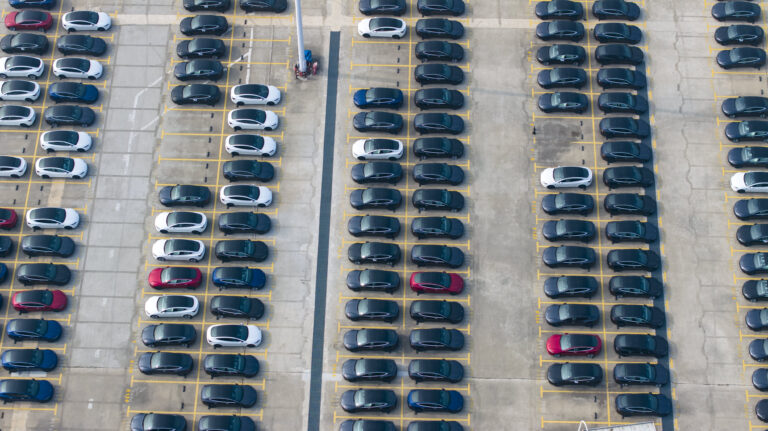Newly produced electric vehicles are seen at Tesla’s Shanghai Gigafactory on December 31, 2023 in Shanghai, China.
Costphoto | Nurphoto | Getty Images
The NEV category currently accounts for more than 40 percent of new passenger vehicles sold in China, with domestic automakers mainly leading the sales lead while foreign companies lag behind.
Stephen Dyer, co-leader and head of Asia automotive at AlixPartners, said at its annual industry outlook event on Wednesday that many foreign automakers have yet to figure out how their products will stand out in China’s EV market.
“Unless [foreign car brands] “Unless they change their mindset on car development and manufacturing to be more risk-taking and look at how they design and manufacture cars from what are called principles, then their position will become increasingly precarious,” Dyer said in Chinese, translated by CNBC.
German luxury car brand Porsche said on Tuesday its sales in China had fallen by a third in the first half of this year, a drop it blamed on consumers “focusing on price-conscious sales.”
Chinese automakers, from Nio to BYD, have already started exporting cars to Europe and other overseas markets as the U.S. raises tariffs on cars from 25% to 100%.
The EU China also announced in June that it would impose tariffs of up to 38% on electric vehicle imports from China to counter “threats of economic harm” to European electric vehicle makers. China responded by saying it was in talks with the European Commission to “reach a mutually acceptable solution” before the tariffs take effect in November.
Dyer noted that even if the EU imposes future tariffs, Chinese cars will still fetch a 20% profit, with the profit margins being the same as if they were sold in the Chinese market. This is because the wave of tariffs is likely to accelerate Chinese EV makers’ localization of production strategies in Europe to cut transportation costs, he added.
BYD is opening a factory in Hungary. Last week, the company announced a $1 billion deal with Turkey and opened a factory in Thailand.
According to AlixPartners, the production cost of a Chinese-made EV is currently 35% cheaper than a comparable vehicle from a foreign automaker.
China is a key market for many of the world’s largest automakers, and they are trying various strategies to maintain domestic sales.
Several Foreign companies are teaming up with local brands to penetrate the Chinese market, Dyer said, pointing to a partnership between Volkswagen and Xpeng Motors earlier this year to launch an SUV after the German automaker bought about a 5% stake in Xpeng Motors for $700 million last year.
Other brands are also trying to lower prices.
Earlier this month, German carmaker BMW launched the new Mini Cooper EV in China through a joint venture with Great Wall Motors (GWM).
Based on Chinese pricing, the vehicle’s retail price will start at the equivalent of $26,140, about 5 percent lower than the fuel-powered Mini Cooper three-door’s price of around $27,520.
By comparison, BYD sells its cheapest EV, the Seagull, for a much lower price of $9,700.
BMW unveiled its first electric vehicle, the Mini Cooper, in 2019 and began deliveries in China and Europe the following year.
Dyer said alliances “make sense” to gain market share, but that foreign automakers will struggle to stay in China long-term unless they change course.
Last month, analysts at Bank of America said Detroit-based US automakers should exit China “as soon as possible” because they are losing out to Chinese EV giants.
According to research from AlixPartners, Chinese NEV makers have cut the development time for new models to 20 months, half the 40 months required by China’s traditional auto brands.
The research firm noted that Chinese NEV-only brands are releasing new models much earlier than non-Chinese brands, and that these vehicles have technology and battery specifications that are two to three years more advanced than those planned by foreign companies.
Electric vehicles are less complicated than those powered by internal combustion engines, and a big challenge for the industry is convincing consumers to buy battery-powered vehicles, primarily by reducing range anxiety.
The Chinese government has mandated the construction of battery charging stations across the country, and start-up NIO is rolling out battery-swap stations that it claims can fully charge its drivers in just minutes.
Another issue for foreign automakers is competing with local labor, as Chinese workers are willing to work much longer hours.
Dyer said Chinese EV workers are working as much as 140 hours of overtime a month, far more than the 20 hours worked by traditional automakers around the world, and pointed to the Chinese people’s “resilient spirit.”
AlixPartners expects this drive to enable Chinese brands to capture more than 70% of China’s NEV market by 2030 and a third of the global auto market, or 9 million cars per year.

